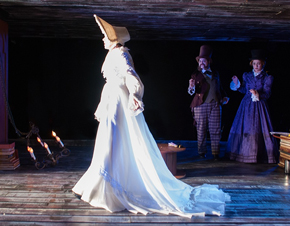
Edgar Allen Poe's tale of the doomed twin siblings in The Fall of the House of Usher is a classic in American literature. In the original telling, the fate of the doomed mansion is to sink into the marshy New England soil. In the film version, it's destroyed by fire. Sean Graney's adaptation, however, has the family home swept away in the flooding generated by two weeks of rain saturating its foundations and the earth beneath them. The onset of this disaster is signaled by water suddenly gushing from the ceiling.
At theaters like Steppenwolf, this spectacular effect can be easily achieved with an expensive Hollywood-grade rain-machine, but The Hypocrites are a low-budget off-loop theater company operating in a basement with only a bare ten feet of vertical clearance. What magical devices are hiding in the shadows above our heads?
"All the apparatus needs is two inches," admits technical director Michael Smallwood, "It's made from PVC pipes. We needed a lot of those pipes to make it rain over the whole stage, but the only real problem was ensuring that the water fell through the half-inch slots in the stage ceiling. What we did was to install deflectors that funnel the water through the cracks. That's about 150 feet of hardware, total."
What controls the flow of the water? And how much do you need? "I estimate we use about fifty gallons for each performance. Each length of pipe has its own valve, so we can adjust each 'rain curtain' individually, but they're all connected to a master valve that's controlled by an ASM [assistant stage manager] hidden behind the set. The water pump, however, is kind of loud. It's controlled from the booth, so the water has to travel about 70 feet to the playing area, as well as ten feet uphill, in order to be there when the ASM gets her cue."
Do you need chemical-free water for this? "No, it's just plain tap water. Unlike the 'river' in Woyzeck, the actors aren't drinking it or swimming in it, and the equipment isn't sensitive enough to dictate purification. The excess water flows down the rake of the stage to drain out of holes at the end of the pitch. Even so, the furniture and floor got a heavy coat of rain-proof sealer—if it can hold up for years against wet or moldy messes on back-yard decks, ours should be fine for six weeks."
Ah, but with water comes electrical hazards, like the chandelier resting on the floor of the gloomy parlor. "[Lighting designer] Jared [Moore] had dipped all the light bulbs in silicon to keep them from shattering if a few drops landed on the hot lamps, and the sockets, too, so that the dampness couldn't get in and cause a short circuit." Smallwood recalls, "Oh, and since an actor has to stand in wet shoes and grab the fixture, we connected it through a breaker switch, like the one in your bathroom that stops anything bad happening if the hair dryer falls into the bathtub."
Have any audience members in the alley-style seats reported being caught in a shower? "When we tested the distance with the pipe placed closest to the edge of the stage, water flew everywhere! Now we have a six-inch rim on the stage that was originally meant to mask some lights, but it helps ascertain that nobody slips and falls leaving after the show."
He sighs, "You have to remember that, in a Hypocrites show, there's almost always something—dirt, paint, food, toothpaste, an exploding blood pack. At least this time, it's just water."
The Fall of the House of Usher runs at the Chopin Theater through September 23.
Mary Shen Barnidge
Contributing Writer

 Follow Us On Twitter
Follow Us On Twitter